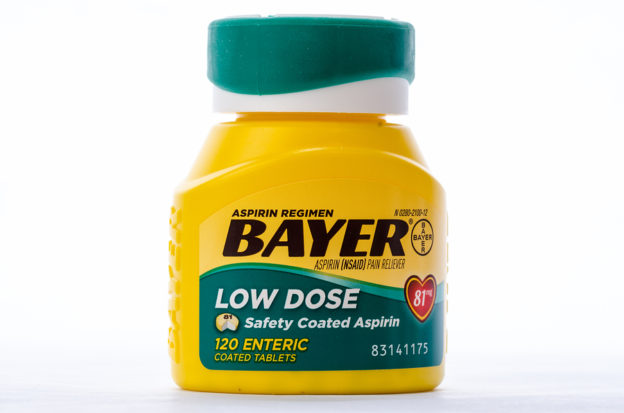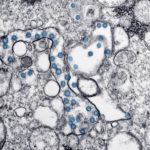By David Blyweiss, M.D., Advanced Natural Wellness
February 24, 2020
There are very few times when I’m in total agreement with the FDA…
But when it comes to the dangers of low-dose aspirin as a way to prevent heart attacks, we finally see eye-to-eye.
One of the most common questions I hear from patients is, “Is baby aspirin good for my heart? Should I be taking it every day?”
Everyone wants to protect their heart health, and taking low-dose aspirin sounds like an inexpensive way to do it.
After all, what harm could come from taking an over-the-counter pill intended for children?
Well, let’s talk about that.
You’ve probably already heard that aspirin can cause gastrointestinal bleeds and ulcers. That’s because it interferes with mechanisms that protect your stomach lining and neutralize acid. This can result in bleeding of the stomach and intestines.
In fact, for every two aspirin you take, your body will bleed about a teaspoonful of blood.
MD Exposes the Hidden Danger to Your Eyes

When your eyesight starts to fail, it's a real problem. Suddenly you can't go to the grocery store... you can't get to the doctor if you have an emergency... you can't meet your friends for dinner…
Your "regular" doctor doesn't have time to keep up with the latest research. And the same goes for eye doctors. They go to school to learn how to fit you for glasses and contacts, but have no way of preventing the damage and loss of eyesight that threatens your freedom and independence.
Let me show you something that explains a LOT about how your eyes work.
In my FREE Special Report, I'll show you a HUGE, untapped resource for your eyes that safely and naturally restores clear, effortless eyesight.
Click here to get started...
But the worst possible outcome, by far, is an increased risk of developing a brain bleed. This is something that happens when a blood vessel in your brain ruptures. As the blood leaks into the surrounding tissue, it starts killing off all-important brain cells.
Now here’s a reality check…
If you’re taking low-dose aspirin daily, it can boost your chances of developing either of these conditions by more than 50%!
So you can see why I wouldn’t want an otherwise healthy patient to take a daily dose of baby aspirin!
Aspirin doesn’t Prevent or Cure Heart Disease
Heart disease isn’t caused by a lack of aspirin. In fact, there isn’t even any evidence that aspirin can lower your chance of a cardiac event if you don’t already have cardiovascular disease. It doesn’t lower your risk of developing it, either.
Simply put, heart disease is generally a natural consequence of inflammation, oxidative stress or immune dysfunctioning in your cardiovascular system.
This means that poor diet, inactivity, excess fat, smoking and other unhealthy choices are major factors causing your heart disease. Minor factors in your genes also play a role.
But genetics become less scary when you understand all of the positive changes you could be making just by cleaning up your act.
Popping an aspirin every morning isn’t going to undo the damage that these lifestyle factors cause. And it can potentially add more problems to the equation. In fact if aspirin were to try and come on the market today, it likely wouldn’t be allowed.
The first thing you can do to change this potential problem is to adopt strategies that boost your heart health. That means choosing a Modified Mediterranean style diet. By “modified” I mean tailored to your needs. Then, you should start a high intensity interval training program (after checking with your doctor) and ditch a few other bad habits.
Are You Suffering From...
- Love handles and a pot belly
- Romance that isn't what it used to
- Forgetfulness and inattention
- Low (or no) strength and endurance
- A sex drive that's shifted into neutral...or worse
If so...you may have Mature Male Burnout. Click here to discover more about this unique condition and what you can do about it.
Additionally, if you or your doctor have concerns about blood-clotting issues, there are several healthier and effective ways to help keep your blood flowing safely.
4 Natural Ways to Improve Blood Flow
The risks of taking aspirin every day outweigh the expected benefit. And there are other, less risky ways to keep your blood flowing smoothly through your veins.
I’ve got several favorites that are completely natural. You can even get them as part of your regular food intake.
Eating foods high in nitrates helps your body produce a gas called nitric oxide. Much of the wonderfulness of this compound comes from its’ invigoration of your blood vessels. This not only helps keep your blood platelets from clumping together, it also lowers your blood pressure and protects the delicate inner lining endothelium of your blood vessels.
Some of these foods include beetroot, kale, melon, celery and lettuce. However, the quickest and most effective way to produce more of this compound is with a nitric oxide enhancer.
Look for a plant-based formula that has beetroot juice as its main ingredient. These formulas vary from one manufacturer to another. So, make sure to choose the one that gives you what actually works at a fair price.
Garlic also contains compounds that help keep your blood cells from sticking together. This means improved blood flow and less chance of clotting. It also helps to prevent oxidation of LDL cholesterol, lowers blood pressure and protects against free radical damage.
So it’s definitely a heart-healthy food. I like aged garlic like Kyolic. It’s in a capsule you swallow, so you don’t need to stress about bad breath.
Ginger is another winner. In fact, it contains compounds that have even more anti-platelet activity than aspirin does. It is anti-inflammatory and works extremely well as a blood thinner in patients with heart disease and diabetes. And they actually sell it in jars both pickled and unpickled, sliced or minced. You don’t have to slice and chop it yourself.
Gingko Biloba is another favorite of mine. It interferes with a chemical in your body that causes blood platelets to cling to the walls of your blood vessels. Try a gingko biloba tea, or supplement with 120 to 240 mg daily.
Speaking of teas, organic green teas are rich in EGCG which also improves the functioning of your cardiovascular endothelial lining.
And of course fish oils. Stay away from the cheap ones, their price reflects lack of quality in sourcing and in quality management and manufacturing. Three to six grams a day in divided doses with meals works for me since the bottle is on my kitchen table.
Now, all of these foods and/or supplements can maximize your blood flow nutritionally. So it’s important you never eat these foods (or their supplement versions) if you’re already taking a blood thinner like Coumadin, Heparin, Xarelto, or Eliquis. Add to that list any other new name and chemical which appears on the drug market.
It’s also a good idea to have your doctor give you a full list of foods that interact with these drugs to avoid serious bleeding issues.
SOURCES:
De Berardis G, et al. Association of aspirin use with major bleeding in patients with and without diabetes. JAMA. 2012 Jun 6;307(21):2286-94.
Use of Aspirin for Primary Prevention of Heart Attack and Stroke. Information for Consumers. U.S. Food and Drug Administration. May 2014.
Webb AJ, et al. Acute blood pressure lowering, vasoprotective, and antiplatelet properties of dietary nitrate via bioconversion to nitrite. Hypertension. 2008 Mar;51(3):784-90.
Makheja AN, et al. Antiplatelet constituents of garlic and onion. Agents Actions. 1990 Mar;29(3-4):360-3.
Bordia A, et al. Effect of ginger (Zingiber officinale Rosc.) and fenugreek (Trigonella foenumgraecum L.) on blood lipids, blood sugar and platelet aggregation in patients with coronary artery disease. Prostaglandins Leukot Essent Fatty Acids. 1997 May;56(5):379-84.
Nurtjahja-Tjendraputra E, et al. Effective anti-platelet and COX-1 enzyme inhibitors from pungent constituents of ginger. Thromb Res. 2003;111(4-5):259-65.
Peng SY, et al. Effect of ginkgolide B on the platelet-activating factor induced changes of chemotaxis and cytoskeleton of macrophages. Yao Xue Xue Bao. 2006;41:156-160







